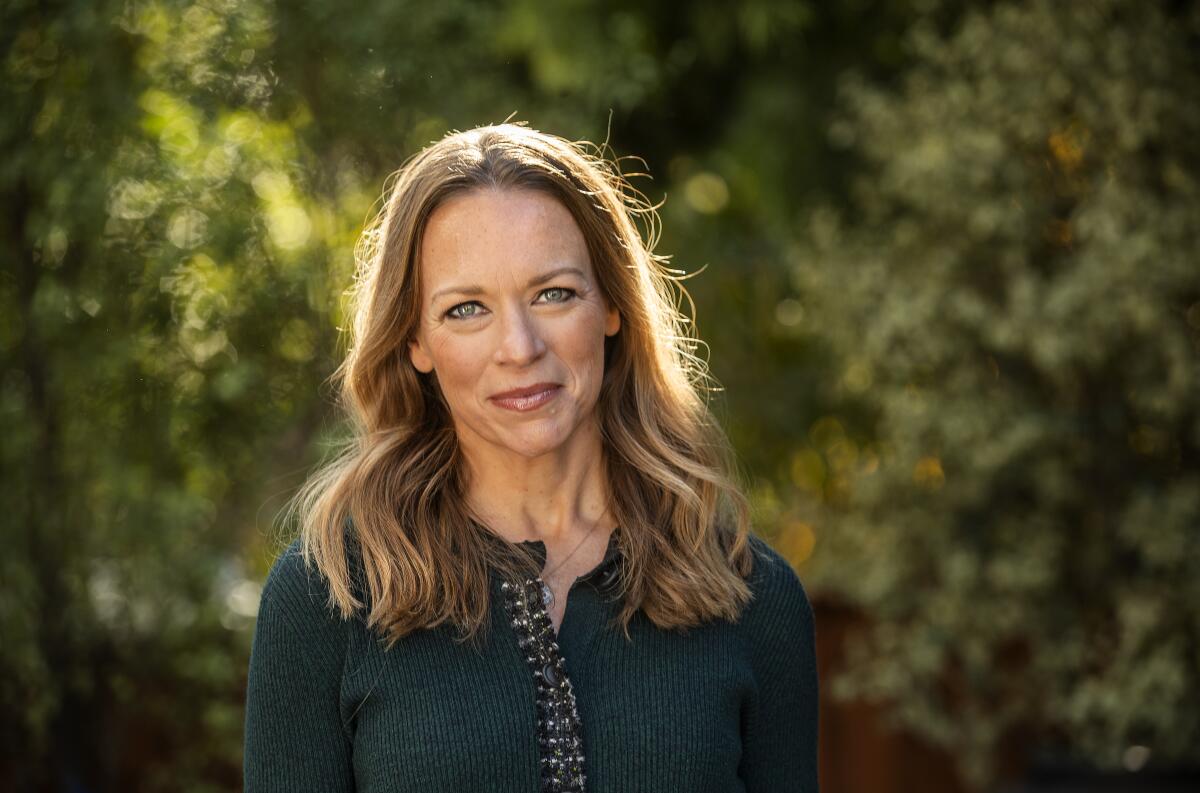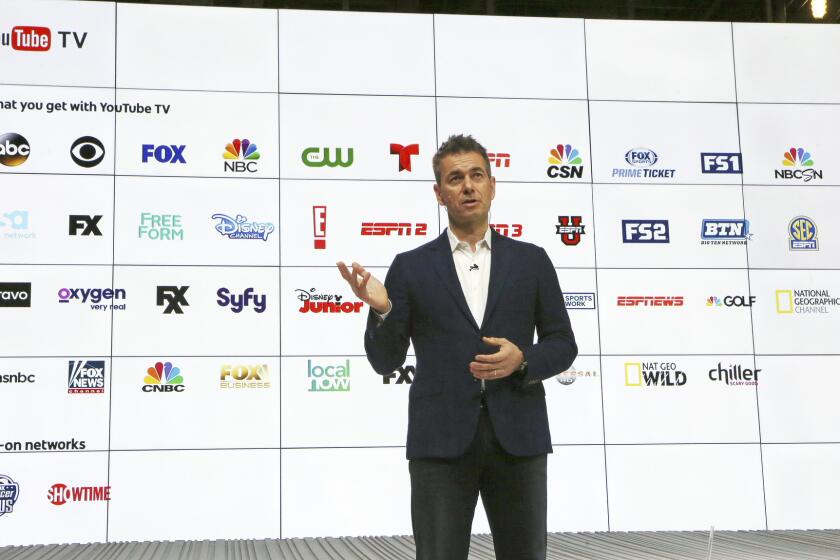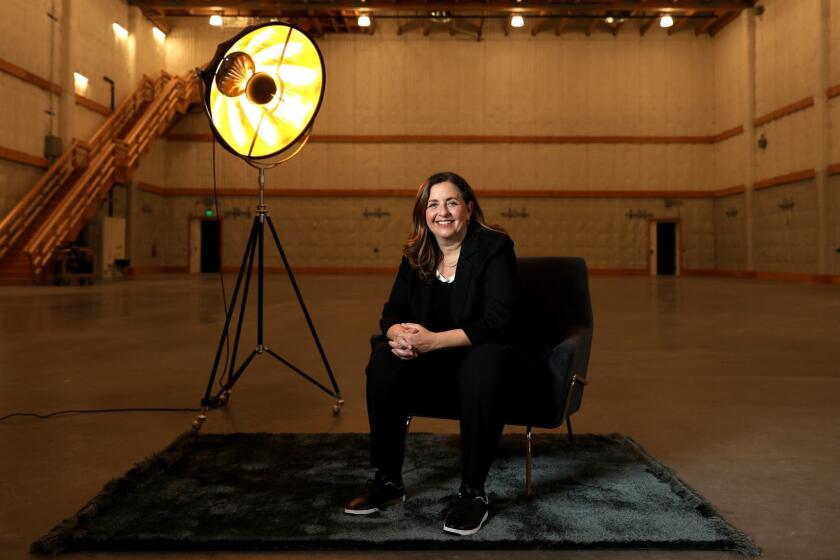YouTube has gone from Hollywood pariah to partner. Meet the executive who led the change

- Share via
When Kelly Merryman arrived at YouTube six years ago, the dust had just cleared on a contentious $1-billion lawsuit with Viacom that had dragged on for years.
Inside the business of entertainment
The Wide Shot brings you news, analysis and insights on everything from streaming wars to production — and what it all means for the future.
You may occasionally receive promotional content from the Los Angeles Times.
The New York cable television giant complained that Google’s YouTube had knowingly allowed its users to post Viacom videos, including clips from “South Park” and “The Daily Show With Jon Stewart,” on its site without permission.
The case was settled in 2014 but highlighted the fraught relations YouTube had with media companies that viewed the vast video sharing site as a competitor that profited off unauthorized clips of their popular shows.
“There was more trust that needed to be built,” said Merryman, YouTube’s vice president of content partnerships.
Since then, Merryman has worked tirelessly to change Hollywood’s perception of YouTube from pariah to partner. She’s persuaded media companies to use the vast reach of YouTube to promote their shows and films. The premium content also benefits YouTube, which takes in revenue from ads placed on the videos and shares that money with partners.
The growing ties, deemed unfathomable 15 years ago, have strengthened during the COVID-19 pandemic, as studios have increasingly relied on YouTube to lure younger audiences to new streaming platforms.
Studios including NBCUniversal used YouTube as one of the digital platforms for releasing more than 10 paid video-on-demand titles in 2020, including “Trolls World Tour.” The Trolls movie brought in $95 million during its first three weeks in online sales across a variety of platforms, according to a person familiar with the matter who was not authorized to comment.
“We’ve gone from the platform that made them no money and they were suing to the platform that is paying out massive amounts of money and lots of usage for them,” said Robert Kyncl, YouTube’s chief business officer. “Kelly is right in the center of all of this.”
Several media giants are teaming up to challenge Google Inc. and its YouTube video-sharing service, seeking to blunt their incursion into the entertainment business.
The 44-year-old former Netflix executive oversees a team of more than 300 people in the U.S., Canada and Latin America, including staffers who work with hundreds of content partners. She lives in Manhattan Beach and, until the pandemic struck, worked out of the historic Spruce Goose hangar in Playa Vista, where Google has established an expanding presence in Southern California.
Part of her role is to serve as a bridge between media partners and other aspects of YouTube. Her team works with product, engineering, operations and marketing colleagues at YouTube.
“What I found at YouTube as well as my time at Netflix is nothing is a substitute for sitting with your partners and understanding their concerns, their ideas, the areas in which you can be helpful to them,” Merryman said.
Merryman, who served in a variety of executive roles before landing her current job, has a background in finance. Growing up in Houston, she loved theater, performing as a dancer in “Singin’ in the Rain” in high school. But Merryman says she wasn’t a triple threat and found her calling on the business side of entertainment. She graduated from the University of Texas at Austin with a finance degree and worked as a consultant at Bain & Co.
“I sort of very quickly recognized that I didn’t want to be the person just creating the slides that helped someone else change their organization, “ Merryman said. “I wanted to be the change.”
She later went to Harvard Business School for her MBA and became an executive director of digital services and distribution at Sony in 2004. Three years later, she became vice president of content acquisition at Netflix.
At Netflix, she developed a knack for translating what the streamer was doing in a way that traditional media companies would understand. A decade ago, when Netflix was trying to get more TV shows on its platform, Merryman was instrumental in brokering a deal with Warner Bros., said Kyncl, who worked with her at Netflix.
Merryman also saw an invaluable opportunity for Netflix to expand globally.
The company that defined the concept of binge watching has continued to reinvent itself. But as Disney, Apple and others enter the streaming business, Netflix faces the biggest challenge in its history.
When she told her boss, Chief Content Officer Ted Sarandos, that she planned to focus on international growth full-time, he supported the idea but warned her that she would lose her job if it didn’t work out, Merryman recalled. Her bet paid off.
“Kelly was so perfect for Netflix in those early days,” Sarandos, who last year also became Netflix’s co-chief executive, said in a statement. “She is smart, curious and a hard working problem solver, and in those days it was all new and full of problems.”
Kyncl recruited her for her current job in late 2014.
“I knew that I needed somebody like that who’s strategic and who’s an operator to come into our fast-growing business,” Kyncl said.
One of Merryman’s first tasks was to deepen YouTube’s relationship with the biggest and most powerful studio, the Walt Disney Co.
Like many studios, Disney was concerned about how YouTube managed videos that included pirated content. Merryman addressed those concerns by touting Google’s technology, including ContentID, that flags unauthorized content for media partners and allows them to choose whether to take those videos down or profit from ads placed on them. Companies can sometimes benefit from those unauthorized videos: For example, when fans post sing-along videos of Frozen’s “Let It Go,” it increases the value of the brand, she said.
Long ago in a galaxy not so far away, selling toys was a lot simpler. Put a commercial on TV.
During discussions over YouTube’s live TV service in 2016, Disney wondered whether YouTube could make it easier for viewers to find all of ESPN’s live events playing at a given time, recalled Justin Connolly, president of platform distribution for Disney.
YouTube TV did not have that feature at its launch, but Merryman tasked a group from her team to explore the idea, Connolly said.
“How is it that as a consumer you can actually choose between 12 to 20 different options all on a single screen that sits in front of you?” Connolly said. “That’s not something that everybody can do and figure out. It was a good example of... bringing the creativity of an executive who understands what it is we’re trying to create.”
Partnerships with Disney and other media companies have helped boost YouTube’s profile and generate more money for the company.
YouTube made $15 billion in ad revenue in 2019, up 36% from 2018, Google parent Alphabet has reported. Its partners have also been crucial to YouTube expanding its live TV offering, YouTube TV, which has more than 3 million subscribers and more than 85 networks, including ABC, FOX and CNN.
YouTube has a massive global audience, with more than 1 billion hours of video watched on its platform each day. When the pandemic hit, YouTube’s viewership skyrocketed and it became a haven for media companies looking to expand and connect with their audiences as productions shut down or scaled back.
Late-night hosts pivoted to filming themselves at home, sharing interviews on YouTube. YouTube organized two interviews with “The Daily Show’s” Trevor Noah and infectious disease expert Dr. Anthony Fauci, driving more than 18 million views.
Movies set to open exclusively in theaters, like “Trolls World Tour,” were instead simultaneously distributed on platforms including YouTube.
Google Inc. is stepping up its march to become a full-service entertainment destination with its YouTube TV service, which will enable subscribers to watch live feeds of top television networks for $35 a month.
YouTube has also been a way for media companies to market their streaming services to younger audiences, many of whom have quit or never signed up for a cable TV service. A person watching a clip of a show on YouTube is 33% more likely to watch the program on TV, according to Nielsen.
To pump up interest for its Disney+ streaming service, Disney released a compilation of clips on YouTube from shows like “The Simpsons,” where the animated family parodied Star Wars as “Cosmic Wars.” In October, Disney launched a show on YouTube called “What’s Up, Disney+” hosted by YouTube video creators Jenny Lorenzo and Andre Meadows that promotes what’s new on the service and talks with the stars from the programs.

“When someone shows up to YouTube, it becomes a pretty powerful tool to create social dynamics in terms of communities around Star Wars, Pixar or Marvel that then we can use in terms of ‘pay to get more of this, the only way to get it is on Disney+,’” Connolly said.
NBCUniversal’s streaming platform, Peacock, has also has promoted itself on YouTube. One of the studio’s popular YouTube channels is “The Office,” which became available on Peacock on Jan. 1.
“Figuring out how we leverage those audiences that are on the platform to drive awareness and conversions into Peacock — they’ve been a great partner,” said Maggie Suniewick, president of NBCUniversal Digital Enterprises.
The company that defined the concept of binge watching has continued to reinvent itself. But as Disney, Apple and others enter the streaming business, Netflix faces the biggest challenge in its history.
To be sure, YouTube — once the main go-to site for video creators — faces more competition from Facebook and rivals such as TikTok that specialize in 15-second videos. In September, YouTube launched Shorts, a feature that allows users in India to record short videos, with plans to bring it to more countries.
YouTube doesn’t want to compete with Netflix. How Susanne Daniels is getting ahead of streaming wars
Four years ago, veteran TV executive Susanne Daniels was tasked with an ambitious plan: build a set of original programs that would leapfrog YouTube into a prominent player in the subscription streaming marketplace, competing against the likes of Hulu and Amazon Studios.
YouTube has also pivoted away from its earlier ambitions of competing directly with Hulu through its premium subscription service. In 2019, the video sharing company said it would focus more of its original productions around YouTube stars, celebrities and music artists.
“There’s fierce competition for eyeballs and for people to be figuring out the best way for storytellers to get their stories out and to grow the value of those franchises,” Merryman said.
Merryman’s friends believe she’s up to the challenge.
“Kelly wants to win all the time, and it’s contagious,” said Sean Carey, who worked with Merryman at Sony and Netflix and cofounded the podcast company Auddy. “ She’s certainly worked harder than anybody.”
More to Read
Inside the business of entertainment
The Wide Shot brings you news, analysis and insights on everything from streaming wars to production — and what it all means for the future.
You may occasionally receive promotional content from the Los Angeles Times.














